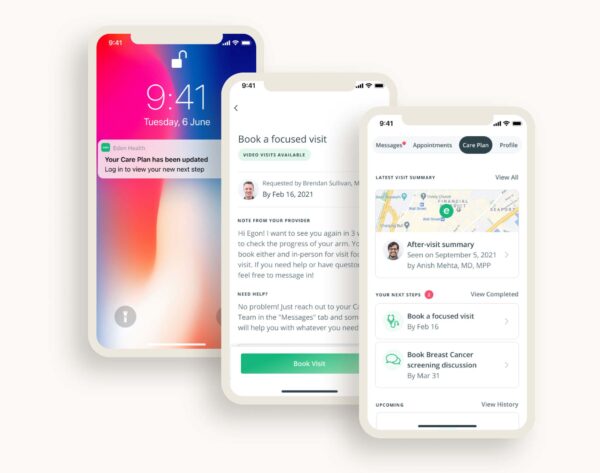
In a bid to help employers tackle rising healthcare costs and provide better engagement for employees managing their health, Eden Health is launching care plans that combine predictive technology with patients’ medical records,
In an interview with MedCity News, Dr. Anish Mehta, a medical director for care transformation at New York City-based Eden Health, said that this model will serve as a care blueprint for patients. For instance, employees on an Eden Health care plan will receive after-medical visit summaries, recommendations for next steps and customized treatment plans.

With the Rise of AI, What IP Disputes in Healthcare Are Likely to Emerge?
Munck Wilson Mandala Partner Greg Howison shared his perspective on some of the legal ramifications around AI, IP, connected devices and the data they generate, in response to emailed questions.
The company touts a collaborative approach to employee health through in-person and virtual care and a mobile app that can be used to access primary care and mental health services, navigate insurance and manage referrals for additional care. Its care plans, which are available through Eden Health’s app, draw on predictive technology to recommend preventive treatments tailored to lower-risk and higher-risk patients. Patients are reminded to schedule follow-up appointments, screenings and annual wellness visits, along with adhering to prescribed treatments.
A major area of focus for the company is finding a way to get past patients’ propensity to delay or avoid recommended treatment or preventive care, a problem that’s only gotten worse with the pandemic.
Eden Health contends that too much of the burden of medical follow-up is placed on the patient.
Instead, what Eden does is address the majority of a patient’s healthcare needs — and if they require specialty care, to provide a referral for that, Mehta said.
Eden Health seeks to keep patients engaged to alleviate gaps in care. After a medical visit, patients often receive instructions from their provider — say to have blood pressure checked in a couple weeks, if it’s a concern. But the subtext is that if patients don’t follow up, neither will providers, Mehta said. Often that’s where things drop off.
“The care plan feature really lets us more proactively engage with patients,” he said.
That includes providing a reminder for the patient to recheck blood pressure in two weeks and detailing possible next steps, like making a change to medication if a patient’s blood pressure continues to rise.
“Traditional healthcare puts too much on the patient rather than being rooted in continuous engagement and comprehensive care management,” said Matt McCambridge, co-founder and CEO of Eden Health, in a statement. Officials at Eden Health said the care plan and the company’s overall approach seek to change that, so patients are more engaged and get all the healthcare — including recommended follow-up — that they need.
By engaging patients so that they don’t delay care, self-insured employers also benefit from lower costs by reducing the probability that their employees would need expensive emergency care down the road. The approach reflects a shift in the healthcare industry toward a patient-centric model that helps consumers navigate their care instead of leaving patients to do that themselves. This is manifest in apps, and convenient virtual and in-person access to primary care that’s also offered by Eden Health’s competitors like Crossover Health and HealthTap.
Photo: Eden Health














